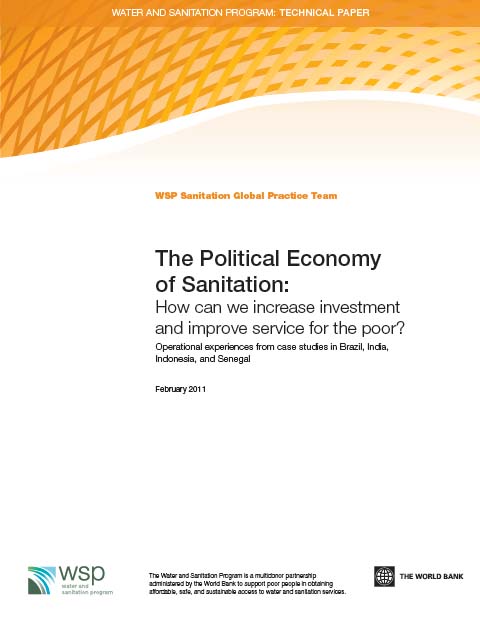/topics/health
Health
Rajiv Gandhi National Drinking Water Mission – Report of an evaluation study by the Planning Commission (2010)
Posted on 23 Aug, 2011 10:17 PMThis evaluation study report by the Programme Evaluation Organisation, Planning Commission attempts to document the major achievements in rural water services under Rajiv Gandhi National Drinking Water Mission. It does so by assessing the extent of coverage and access to improved services in the rural areas.
Sanitation - The hygienic means of promoting health - Indian Journal of Public Health
Posted on 23 Aug, 2011 11:10 AMThis article published in the Indian Journal of Public Health highlights the importance of sanitation as hygienic means of dealing with health of populations and presents the history and the definition of sanitation and highlights t
Plants used as agricultural seasons indicator by Mao Naga tribe - Manipur (India) - Indian Journal of Traditional Knowledge
Posted on 21 Aug, 2011 07:38 PMAgriculture is the main occupation of the tribe and they have a unique way of knowing plantation season for different crops by observing the flowering of some plants. The indicator plants are peach, wild cherry, camel foot and dancing girl.
Indigenous knowledge of soil fertility management in the humid tropics of Arunachal Pradesh - Indian Journal of Traditional Knowledge
Posted on 21 Aug, 2011 05:28 PMThis paper published in the Indian Journal of Traditional Knowledge highlights the findings of a study that correlates the indigenous knowledge and scientific knowledge in assessing the nutrient availability status of agricultural soil as practised by the Nyishi tribes who use visual properties such as colour, texture and topographic positioning of land/terrain.
Malaria control manual - Guidance for malaria control projects in humanitarian situations - Published by OXFAM
Posted on 20 Aug, 2011 10:32 PMThis manual on the Eldis site published by OXFAM provides guidance to public health promoters, water and sanitation engineers, project co-ordinators
Virological evaluation of domestic water purification devices in India - Inadequate quality and the need for virological standards - Tropical Medicine and International Health
Posted on 14 Aug, 2011 03:36 PMThis paper published in the journal
Integrated Low Cost Sanitation Scheme - Revised guidelines by the Ministry of Housing and Urban Poverty Alleviation (2008)
Posted on 12 Aug, 2011 04:29 PMThe objective of the scheme is to convert or construct low cost sanitation units through sanitary two pit pour flush latrines with superstructures and appropriate variations to suit local conditions (area specific latrines) and construct new latrines where economically weaker sections household have no latrines and follow the in-human practice of defecating in the open in urban areas. This would improve overall sanitation in the towns.
The challenges of ecological sanitation in coastal south India - A case study of Kovalam town - South Chennai (Tamil Nadu) - A presentation
Posted on 11 Aug, 2011 05:48 PMThis presentation by Sekhar Raghavan, Director, Rain Centre, Chennai, India highlights the experiences and the challenges faced by Rain Centre in introducing ecological sanitation in the coastal town of Kovalam near Chennai, Tamil Nadu, India along with Coastal and Rural development Trust (CRDT), a small non profit centre based in Kovalam .
The coastal town of Kovalam was selected as a case because of its peculiar situation with its location in a fast developing peri-urban area in proximity to Chennai city characterised by good groundwater situation, adequate land and housing facilities, but with a glaring and urgent need and demand for toilets.
Plastic Waste (Management and Handling) Rules (2011)
Posted on 28 Jul, 2011 08:21 AMThis document on the Ministry of Environment and Forests site includes the Plastic Waste (Management and Handling) Rules replaces the earlier Recycled Plastics Manufacture and Usage Rules,1999 (amended in 2003).
The political economy of sanitation - How can we increase investment and improve service for the poor? – A report by Water and Sanitation Program
Posted on 26 Jul, 2011 02:53 PM This global study attempts systematically to understand and thus help practitioners manage the political economy of pro-poor sanitation investments and service provision.
This global study attempts systematically to understand and thus help practitioners manage the political economy of pro-poor sanitation investments and service provision.
It aims to provide practical advice to multi-lateral agencies and sanitation practitioners to help them better manage stakeholder relations and effectively maneuver within the complex institutional relationships of the sanitation sector in order to enhance the design, implementation, and effectiveness of operations that provide pro-poor sanitation investments and services. The ultimate goal is to improve health and hygiene outcomes.
This study follows current approaches to political economy - interdisciplinary inquiry drawing upon social and political theory and economic principles - to understand how political actors, institutions, and economic processes influence each other. This study’s conceptual framework combines a diagnostic component with a typology of actions to help translate analytical findings into more effective support to operations and investments.





